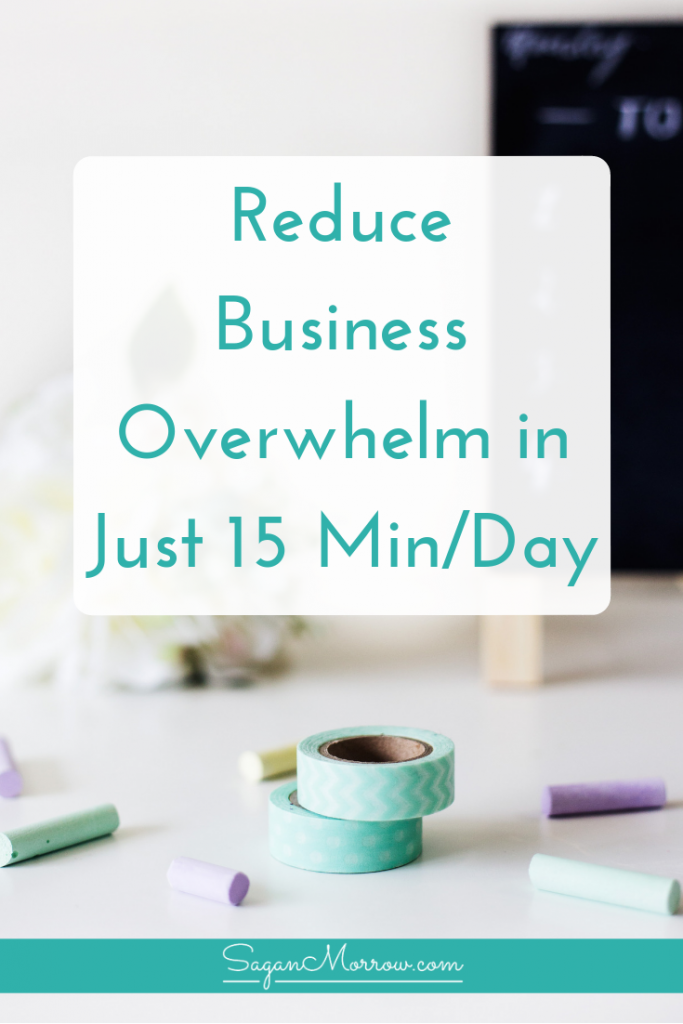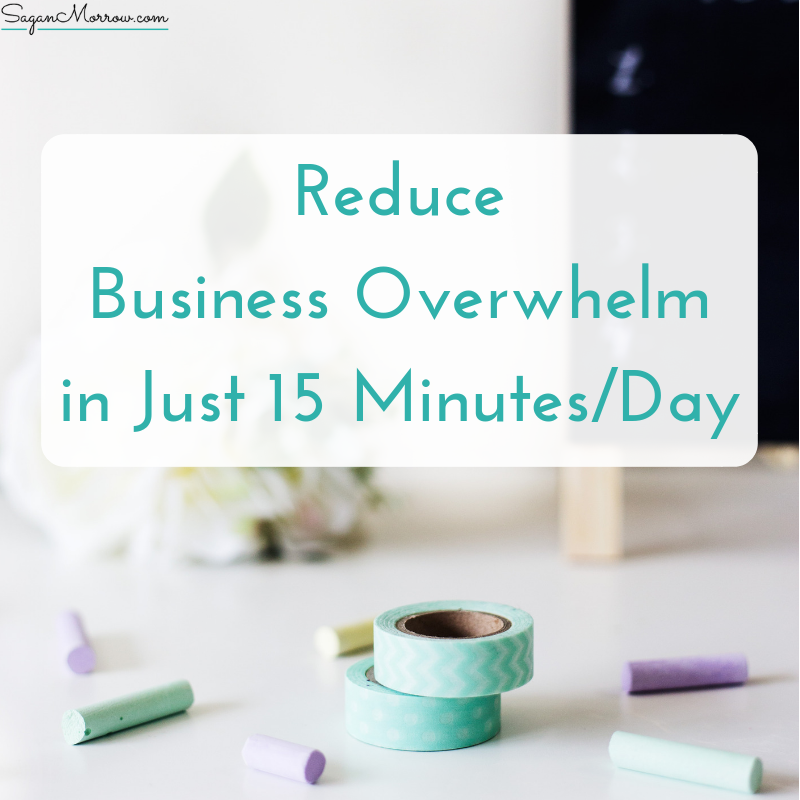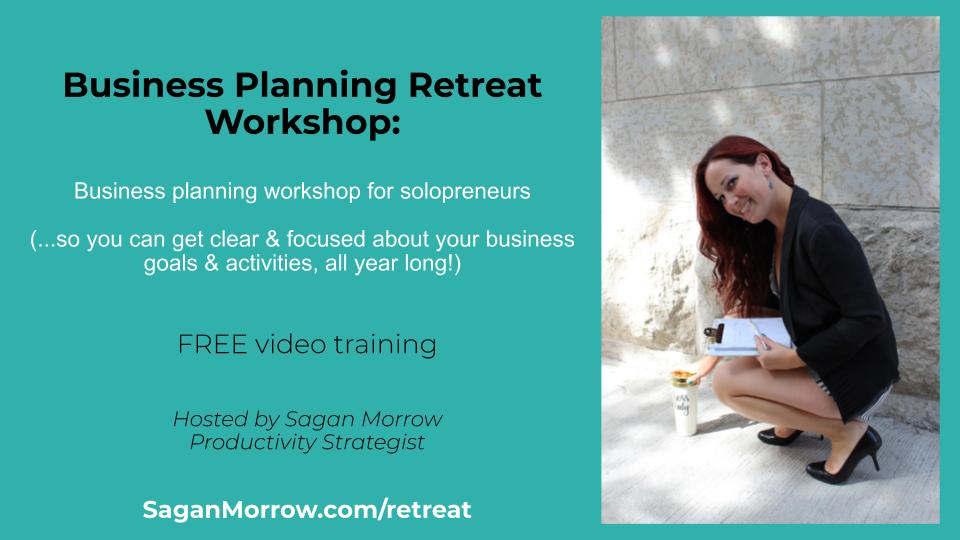Business overwhelm is a reality for all of us---regardless of how good you might be at time management. Luckily, there are strategies you can implement to help reduce business overwhelm in your life.
This blog post outlines what you can do, step by step, to reduce business overwhelm. As you'll see, there are many things you can do... so to keep yourself from getting even more overwhelmed, consider breaking these ideas down by doing just one or two tasks each day!
Each of the tips below can be done in just 5---15 minutes each day, so they're totally doable. Commit to doing one each day for the next month and see how much you can reduce business overwhelm on an ongoing basis.
This is a marathon, not a sprint. Reducing business overwhelm is about being strategic, getting clarity, improving focus, and making small changes that add up to big changes over time. You've got this!
Your step-by-step guide to reduce business overwhelm...
1) Identify what you feel most overwhelmed with in your business right now.
I know it’s tempting to say “everything!”, but I bet there are a few crucial things that make you feel more overwhelmed than others.
Is it trying to figure out what direction you should take your business in? Managing clients? Marketing your business effectively? Make note of the specifics and write it down.
If you're feeling like there are too many things, then set a timer for 3---5 minutes and write down as many things as you can of all the things that overwhelm you. When the timer is up, assess what you wrote down: you might notice some commonalities that all indicate a larger thing you're feeling overwhelmed with. Write that bigger thing down so you face it as a reality in your life.
2) Do a brain-dump of all your thoughts and business ideas.
This is one of my favourite ways to beat the overwhelm. Start by writing down all of your different thoughts, ideas, for your business, etc. Get ALL of it on paper so you don’t forget anything.
Note: this is simply about getting it all on paper---we’ll organize your thoughts and ideas later on. For now, give yourself a 15-minute time limit to write down all of your ideas on a big piece of poster paper. There's no need for them to take up valuable real estate in your brain!
3) Organize your ideas based on similarity (group them together where possible).
Once you get all your ideas written down, then you can organize them into lists, or perhaps draw colour-coded circles around similar/grouped items. This is going to help you to see where there’s some overlap and get a clearer picture of how to organize it all better.
For example, maybe you have ideas around starting a variety of different kinds of services, or perhaps you want to write a book, or maybe you want to explore new marketing methods. Try organizing all of those thoughts/ideas so you can see similarities that come up.
Stuck on coming up with business ideas? Get inspired with 15+ small business growth ideas.
4) If you’re trying to decide what ideas you should focus on with your business, then I want you to take notes beside each of your ideas/thoughts based on:
a) your interest level,
b) your skill level,
c) the time/monetary commitment, and
d) the return on that item.
Once you do this, you might start to see which areas you can prioritize, and you might notice that some of your efforts haven’t been put in the most beneficial parts of your business.
It's okay to shift directions! That's part of normal business growth. Being aware of these things and being willing to focus with more intention on some areas compared to others is all part of the process.
5) If you’re stuck on what you should choose to prioritize, go with the idea you’re most interested in.
You can improve your skill. You can find time or money for your idea.
...But passion and interest in your idea is something you absolutely, fundamentally, need to have in order for you to give it your all and have success with it.
So, at the end of the day, if you're feeling at a loss for what idea you should go with first... choose that which most inspires you and ignites that fire!
6) Do a brain-dump of all the tasks and priorities you have right now for your business.
This could include things like a list of all your clients, behind-the-scenes administration tasks, etc.
This brain-dump is really useful for, once again, getting all those things that might be churning around in your brain OUT of your head and onto paper.
7) Once again, organize your brain-dump of tasks into groups.
Do you have a lot more tasks listed under one area compared to another? Is your client project area looking a little slim compared to your marketing area, for example?
Organizing your tasks into grouped areas will enable you to see what you need to make more of a priority for in your business. Grouping various tasks can be a huge eye-opener (yes, even for those of us who have been in business for years), so it's an essential step to reducing business overwhelm.
8) Assign a rough time estimate per week to each of the tasks you listed yesterday.
For example, if you have a client on retainer, mark down how many hours you need to do work for them on average on a weekly basis.
The purpose of this exercise is that you'll get a realistic idea of how much time different tasks take, so you can see what to prioritize (and what you can actually fit into your day/week, depending on other things you have going on with your life and business).
Learn how to get retainer clients.
9) Once you have average time estimates on a weekly (or monthly) basis for your tasks, then you can start looking at which items you can cut back on in your business.
Is anything taking up WAY more time than it should? Or does it turn out that you actually have a lot more time than you expected in your day?
I started tracking my time on Toggl and it was incredible to see exactly where I spend all of my time. Until you start being diligent about this---even if you try it for just a couple weeks---you won't have a clear or accurate idea of where your time goes.
Understanding where your time goes is so helpful for reducing business overwhelm because it empowers you to take more control over how you manage your own time.
10) Do a brain-dump of all the questions you have about your business.
Can you tell I like brain-dumping? 😉 But seriously, this is a really useful stage to go through. What kind of questions do you have about business? Sometimes our brains get too full of questions, and that results in feeling paralyzed with overwhelm.
Reduce business overwhelm by listing as many questions as you can think of in the next 15 minutes.
11) Identify where you can go to get the answers to your questions.
Is there an expert you can consult? A book you can read? A course you can enroll in? Research you can do on your own?
Set a timer, once again, and make notes of how you might get answers to your questions. That will help you get a bit more focus for moving forward.
12) Ask yourself what you want out of your business in the next 5 years.
Here’s the thing: you can’t exactly identify the best things for you to be working on NOW, if you don’t know where you want to GET to. That’s why it’s so important to do some bigger-picture planning for your business.
Want some extra help? Get business planning tips for solopreneurs.
13) Ask yourself what you want out of your life in the next 5 years.
It's not enough to just think about big-picture planning for your business. When you own your own business, your personal life will absolutely be affected. So you need to take it into account too!
Do you want to move to a different city, or start a family, for example? Asking yourself what you want from your life is fundamental to setting (and achieving) your home business goals.
What is one thing you want from your life in the next 5 years? Write that down.
14) Take a look at your action steps from the previous couple points: do your business goals and life goals match up? (Hint: they should!)
If your business and life goals mesh well together, then that’s a good sign that you’re moving in the right direction with your business idea. If not… then you might want to rethink things a little.
After all, your business and your life are going to be interrelated. It's just a smart move to try to make them interlock and mesh as well as possible so that they can continue to weave and grow together as time goes on.
So... do your business and life goals match up? Do you need to make any shifts now to accommodate one or the other in the future?
15) Set a business goal for yourself, 1 year from now.
It could be a goal to make $X with your business, to have X number of clients, to quit your day job… anything goes! Write down your 1-year goal.
16) Where do you need to be, 6 months from now, in order to reach your 1-year goal?
This is your ticket to making life a little easier! Looking ahead to the future will help you to identify the best action steps to take NOW.
17) Where do you need to be, 3 months from now, in order to be where you need to be in 6 months?
Now that you know where you need to be 6 months from now, in order to meet your 1-year goal… it’s time to figure out where you need to be THREE months from now, in order to meet your 6-month goal!
Why do we do this? Because breaking down your larger goals into more manageable ones can be a game-changer for taking action.
So… where do YOU need to be 3 months from now? Write that down.
18) Identify how the smaller tasks you work on contribute towards your larger goals.
Is there any disparity between your smaller goals and your larger goals? If so, do something about it! Make a change to your business structure so that it’s streamlined.
Each smaller goal should contribute to your larger goals. If there's a disconnect, then you need to address that and figure out where you started to get off track. This will help you stay more focused and, yes, reduce business overwhelm.
19) Take a look at your weekly time-sucks: where does your time and energy go each week?
Are you satisfied with where all of your time goes? Is there a change you could make?

For example, if you get caught in the “Instagram loop,” as I like to call it (I can’t stop scrolling until I’ve seen all the new content!), then reserve only looking at Instagram when you’re waiting for the kettle to boil or when you need a break from work.
Be brutally honest with yourself about this---that's the only way you can make a change.
And here's the key thing to keep in mind: no matter how good you are at managing your time, and no matter how much you have going on in your life... you probably have at least a couple unnecessary time-sucks that you could resolve or improve upon.
(Yes. Even YOU. If you can't find something that's sucking your time, then you aren't being honest enough with yourself. Dig a little deeper to find that time-suck so you can address it.)
20) Identify one thing in your life that you can ELIMINATE in order to make room for business items.
Remember, even 15 minutes here and there can make a big difference. Do some brainstorming---you might discover that you can MAKE more time for your business than expected when you eliminate something that's unnecessary.
21) Find a business bestie to chat, support, and commiserate with.
Everyone can benefit from having a business best friend.
Take a few minutes today to figure out what you’d like from your biz bestie (accountability? Someone to brainstorm ideas with? etc.), and then get hunting for your new BBF! This can make a huge difference to reduce business overwhelm in your life.
Want more? Here are 5 more tips to reduce business overwhelm...
1) Breathe deeply and slowly if you start feeling panicky.
The science behind the correlation between breathing and feeling more relaxed is super cool! Even better, it really doesn’t take that much time or effort out of the day. The trick is to be conscious about breathing.
Make sure you practice healthier breathing techniques often so that slow, deep breathing is more instinctual on a regular, daily basis. That will help you to reduce business overwhelm more consistently as time goes on... just by breathing.
2) Recognize the difference between big-picture goals and smaller daily goals.
You need to have a balance of the two for any business. Your small daily goals should contribute towards your big-picture goals: there needs to be alignment between them, or else what are you working toward?
3) Ask yourself each day, what is ONE thing you can do with your business TODAY to take a step closer to where you want to be in the next 3 months?
It's easy to get caught up in busy work, especially when we feel overwhelmed in business. But you can reduce business overwhelm by identifying just one small task each and every day that will get you a small step closer to meeting your future business goals.
This will also help you to stay more focused, intentional, and on track... which is also a good stress reducer!
4) Above all, when it comes to reducing business overwhelm, you need to ask yourself one simple question: “Am I being honest with myself about what I *really* want and what my obstacles are?”
If you find yourself giving excuses for why you haven’t done XYZ, it might be time to take a good hard look at your options.
It might be that you need to put something on hold in your life or to spend a little bit of money now in order to achieve your goals---but I bet that if you take a good hard look, there will be SOMETHING you can do to keep making progress with your business and go further in the direction that fires you up.
Finally, you might need to alter your goals a little bit, or give yourself a little more time to accomplish certain tasks. That's okay! Be honest with yourself and adjust as needed.
5) Honour where you’re at.
It’s important to be honest with yourself about what’s going on, but that doesn’t mean you should beat yourself up over it. Every single choice you make, every single step you take, is what gets you to the point of reducing business overwhelm and achieving your business goals. YOU’VE GOT THIS!
No matter what stage you're at, it's truly about the journey. It's an ongoing process. It doesn't matter how big your steps are or how fast you're moving: what matters is that you continue making progress and moving forward, and having FUN with it while you're at it... regardless of the speed.

